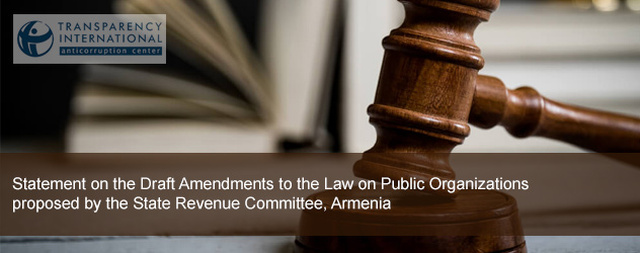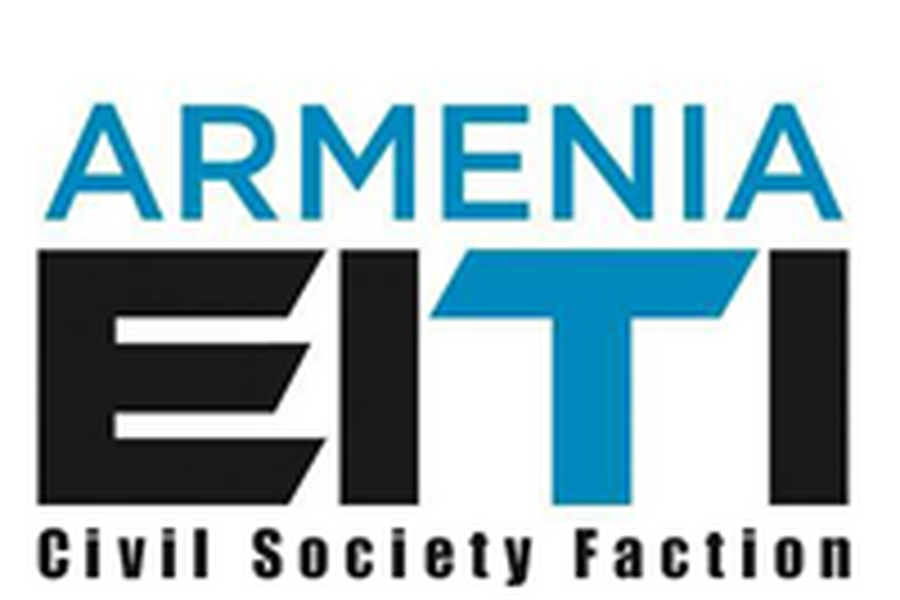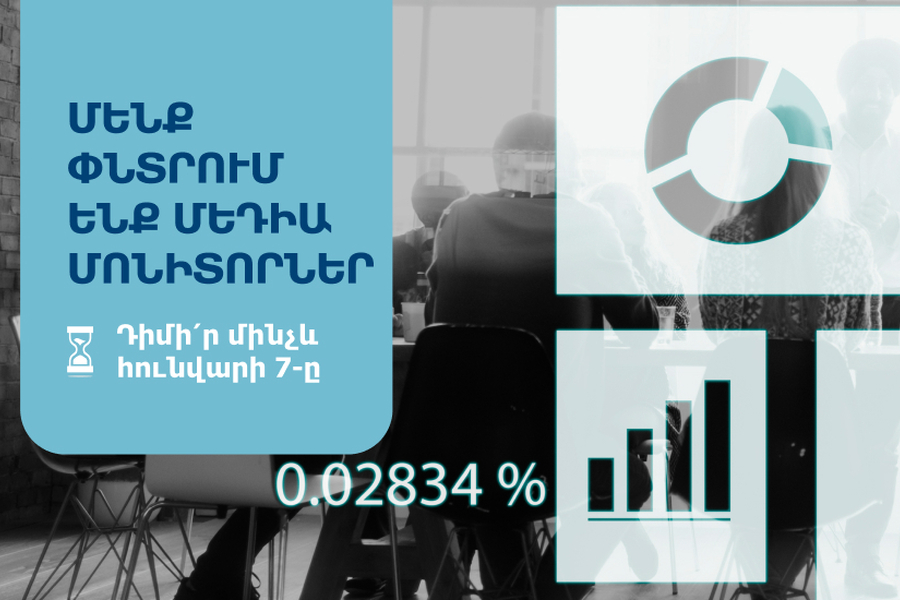Statement on the Draft Amendments to the Law on Public Organizations proposed by the State Revenue Committee, Armenia
On October 29 2018, the Ministry of Justice of the Republic of Armenia published a draft of amendments to the Law on Public Organizations (hereinafter Draft) that introduce changes to the reporting requirements of CSOs.[1]
The current Law on Public Organizations (2016) requires open reporting of CSOs that receive public resources (resources of state or local self-government bodies and bodies or legal entities that manage public resources).[2] The Draft proposes to toughen the reporting for CSOs by extending the requirement to all the public organizations regardless of their sources of funding as well as by including personal information of the donors as well as members, governing bodies, staff and volunteers who have received funding. The main justification for amending the Law on Public Organizations is the stated intention to improve the transparency and public accountability of CSOs as well as prevent misreading of certain provisions and clarify some others. Some other justifications provided by the State Revenue Committee (SRC), are that it is difficult to define the concept of ‘public resource’ and there is a need to prevent money laundering.
It should be noted that before December 2016 the CSOs’ compliance to the law was overseen by the Ministry of Justice, while the financial operations were under the scrutiny of the state revenue service. With the adoption of the new Law on Public Organizations, the control over the compliance to the law was transferred to SRC and a special department on oversight was established. In general, CSO financial transactions, including incomes and expenditures, are subject to reporting to tax authorities, hence the introduced mechanism actually provided for double control of CSOs by tax authorities. It is worth mentioning that this particular provision was squeezed in the Law in the last reading at the National Assembly and was never consulted either with CSOs or with SRC itself.
The newly proposed changes to the Law on Public Organizations raise serious concerns. Those put an unreasonable and disproportionate burden on public organizations without due justification and clarification of the necessity of those in a democratic society, hence restricting the exercise of the right to association prescribed by RA Constitution and European Convention on Human Rights as well as other international commitments of the state. In particular:
- Open reporting of organizations receiving public resources was introduced to the Law on Public Organizations in December 2016 based on broad public consultations with an aim of ensuring the transparency of public expenditures. Induction of such provision was driven by the fact that many millions of Armenian drams were being provided by state institutions to CSOs that were completely unknown to the society, there was no public information about their activities, their achievements and grant outcomes. Moreover, there were recipients of grants who were related to the government officials as well as related to each other. Selection of grantees was completely non-transparent and highly questionable.
Organizations that use public resources are apparently in a different position compared to other CSOs, hence shall bear a larger burden of accountability before the public. Hence, there was a clear and concrete reason for formulating of the requirement within the Law on Public Organizations for higher accountability of CSOs who were entrusted with the management of public assets.
- According to the Joint Guidelines on Freedom of Association by OSCE/ODIHR and the Venice Commission: “104. The resources received by associations may legitimately be subjected to reporting and transparency requirements. However, such requirements shall not be unnecessarily burdensome, and shall be proportionate to the size of the association and the scope of its activities, taking into consideration the value of its assets and income.”[3]
The proposed amendments do not distinguish between CSOs and create unnecessary and disproportionate burden for the majority of associations, including ones without any income, aligning all to those who are managing public resources and are obliged to be accountable to the public in that regard.
- The Draft calls for the public reporting on the income (financial and property) differentiated by sources, including funding from public sources, funding by legal entities and funding by physical persons, whereas all the income sources must be identified, including the names, residency country, and legal status of the donor. The names of the physical persons donating to CSOs are not subject to publication but reported only to SRC. In case of availability, passport data, address and telephone numbers of individual donors will be also reported to SRC. This contradicts to the right of privacy of the donors, both legal entities and physical persons.
According to the Council of Europe Recommendation CM/Rec(2007)14 of the Committee of Ministers to member states on the legal status of non-governmental organizations in Europe: “64. All reporting should be subject to a duty to respect the rights of donors, beneficiaries and staff, as well as the right to protect legitimate business confidentiality.”[4]
According to the Joint opinion of the European Commission For Democracy Through Law (Venice Commission) and the OSCE Office for Democratic Institutions and Human Rights (OSCE/ODIHR) on Ukraine (16 March 2018)[5], donor’s desire to remain anonymous should be respected, and the right to privacy may be interfered with only if necessary in a democratic society, within the limits of proportionality (Article 46). The current draft does not provide sufficient grounds for limitation of the right to donors’ privacy.
- The amendment proposes to publish online the names of members, representatives of governing bodies, staff and volunteers that have used the organization’s financial resources during the year. Such requirement contradicts with the international standards.
According to the OSCE/ODIHR and Venice Commission Joint Guidelines on Freedom of Association: “167. Associations should not be under a general obligation to disclose the names and addresses of its members, since this would be incompatible with both their right to freedom of association and the right to respect for private life. And 231. …. Legislation should also contain safeguards to ensure the respect of the right to privacy of clients, members and founders of associations, as well as provide redress for any violation in this respect.”[6]
- According to Recommendation CM/Rec (2007)14 of the Committee of Ministers to member states on the legal status of non-governmental organizations in Europe: “7. NGOs with legal personality should have the same capacities as are generally enjoyed by other legal persons and should be subject to the administrative, civil and criminal law obligations and sanctions generally applicable to those legal persons.”[7]
It should be noted that the commercial entities in Armenia are not subject to such a scrutiny as prescribed by the Law on Public Organizations and are not required to ensure public reporting. They provide financial reports to the tax authorities and do not publicize the sources of their income and names of staff members or shareholders.
- It is unreasonable to tighten the reporting requirements for associations because of mere failure to define the concept of ‘public resource’ or the general intention to prevent money laundering in the country.Interestingly, the proposed amendments also contradict the conclusions of Moneyval.[8]
Report of Moneyval from July 2018 evaluated Armenia to be in compliance with the recommendations of the Financial Action Task Force[9] and stated that “23. Armenia has clear policies to promote accountability, integrity and public confidence in the administration and management of NPOs, depending on the type of NPO (i.e. specific requirements for foundations, charities, religious organizations, etc.).”[10]
To conclude, SRC does not possess the necessary competencies and understanding of CSO-related international standards and the state’s mandate to ensure the right to association in order to be able to duly perform the legal oversight of non-profit organizations in Armenia. The approach used by SRC is largely natural given its standard tactics used for the tax inspection.
It is important and urgent that the Armenian government revises the authority assigned to oversee the CSOs’ and returns this responsibility to the jurisdiction of the Ministry of Justice, or takes necessary measures to ensure that the oversight by SRC does not work against the notion of the freedom of association, prescribed by the Constitution and international law.
This document has been produced with an input from experts of European Center of Not-for-Profit Law (ECNL), provided in framework of the Action “Monitoring Progress, Empowering Action” implemented with the financial assistance of the European Union.
The following organizations joined the statement
EU EaP CSF Armenian National Platform, comprising more than 260 CSOs of Armenia
Open Society Foundations - Armenia
Civic Development and Partnership Foundation
Eurasia Partnership Foundation
Foundation for Small and Medium Businesses
Urban Foundation for Sustainable Development
Armenian Young Women’s Association (AYWA)
Association “For Sustainable Human Development”
Foundation Against the Violation of Law NGO
Helsinki Committee of Armenia
Martuni Women's Community Council NGO
Center for Economic Right NGO
Social Justice NGO
“Shogher Union” social-educational NGO
Journalists’ Club “Asparez”
Khoran Ard Intellectual Center
“Women’s Forum” NGO
"Spitak Helsinki Group" human rights NGO
[1] https://www.e-draft.am/projects/1283
[2] Republic of Armenia Law on Public Organizations (2016), Article 24
[3] https://www.osce.org/odihr/132371?download=true
[4] https://search.coe.int/cm/Pages/result_details.aspx?ObjectID=09000016805d534d
[5] On Draft Law No. 6674 on introducing changes to some legislative acts to ensure public transparency of information on finance activity of public associations and of the use of international technical assistance and on Draft Law No. 6675 on introducing changes to the Tax Code of Ukraine to ensure public transparency of the financing of public associations and of the use of international technical assistance
[6] https://www.osce.org/odihr/132371?download=true
[7] https://search.coe.int/cm/Pages/result_details.aspx?ObjectID=09000016805d534d
[8] Moneyval is a permanent body of the Council of Europe, which monitors and carries out evaluations on compliance of CoE members with Financial Action Task Force regulations on anti-money-laundering and financing of terrorism.
[9] http://fatfplatform.org/special-recommendation-8
[10] http://www.fatf-gafi.org/media/fatf/documents/reports/fur/Moneyval-1st-Regular-Follow-Up-Report-Armenia-2018.pdf



![[en]logo](https://transparency.am/pics/c/440x330/picture/news-1542352774-0-871474.jpg)
![[hy]logo](https://transparency.am/pics/c/440x330/picture/news-1542353613-0-934143.jpg)



